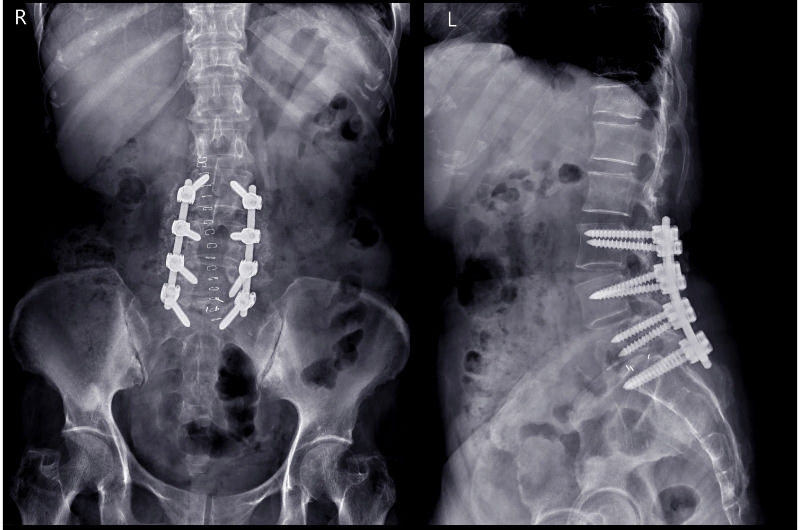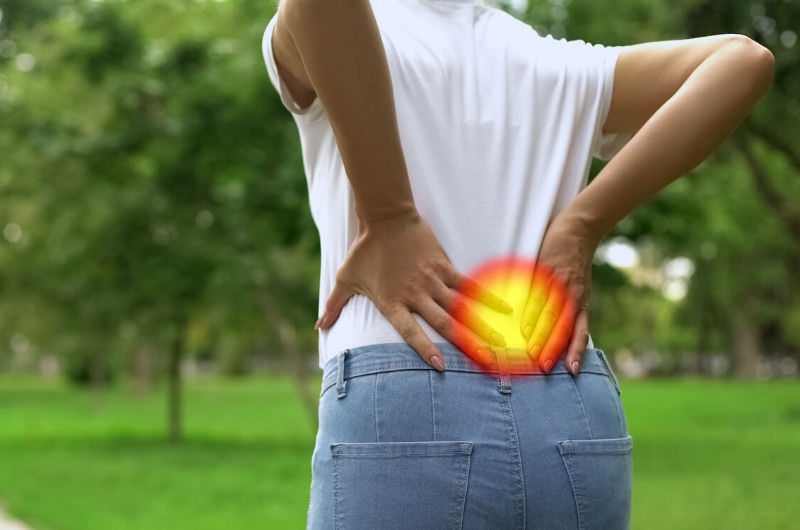Pain associated with the lower back after surgery can cause worry because you may have something called failed back surgery syndrome, known as FBSS. Painful popping or cracking noises are often associated with spinal hardware, synovial fluid in the joints, bone grinding, sometimes with joint manipulation techniques, and even strain on the muscles, ligaments, cartilages, and tendons around your spine. More than 50% of all spinal surgeries are successful, and it’s important to note that no more than 30% of these patients experience successful outcomes after surgery.
Lower back surgery is indicated for low back pain associated with stenosis (narrowing of the spinal canal) and arthritic bone spurs.
According to the National Institute of Neurological Disorders and Stroke (NINDS), it is one of the most common causes of job-related disability. 80% of Americans experience low back pain at least once in their lifetime.
The source of the pain could be muscle strains, sprains, poor body mechanics while lifting heavy weights, arthritis, sciatica, cancer, herniated disc, kidney infections and infections of the spine, etc.
5 causes of painful popping after lower back surgery
1. Spinal hardware

A common source of popping, clicking, squeaking sounds from your body after spine surgery is often the spinal hardware. It is used to correct a deformity or reduce pain.
Spinal fusion surgery is performed to correct a joint deformity such as scoliosis (sideways spine deformity). The rods, screws, plates, or other objects are foreign to your body and, it will take your body some time to get used to it.
During surgery, the surgeons fix the hardware very securely to the structures like your vertebrae and muscle tissue. But these structures can sometimes rub against each other and produce a sound.
These noises can be annoying and can go away slowly or may never resolve on their own but, they are not harmful to your body.
2. Joint manipulations
Joint manipulation techniques are sometimes performed under anesthesia to eliminate any resistance from the patient through their reflexive muscle contractions.
When the joint is manipulated at the full range, it can be painful and, there can be audible popping sounds heard, which indicate the loosening of adhesions in the joints and make the joint mobile and loose.
When a patient wakes up after the procedure, they can experience a bit more pain than before. The patient is given pain medication and advised physical therapy to regain strength and avoid inactivity.
3. Joint grinding
Pain, stiffness, and popping noises in the back are associated with arthritic conditions. Arthritis symptoms progress slowly. Knowing the signs can help treat them and slow down the disease progression.
Arthritis presents with crunching, popping sounds when bending or arching the back. It can be a sign that the cartilage has worn out, and the facet joints are rubbing against each other. This sound is also often called “crepitus.” It can be associated with pain but, sometimes the sound can occur without any pain as well.
Postoperatively the bones in the back can move around and also make sounds. It could be due to degenerative discs, arthritic joints of the vertebrae, bone spurs, and scar tissue formation.
4. Muscle strain
If you hear a pop when you bend and it’s associated with severe pain, it can be a sign of a torn muscle. It most commonly occurs in the lower back.
A severe tear occurs when a muscle stretches or is contracted until it snaps and can be very painful. It requires immediate medical attention.
Other symptoms associated with a muscle tear are severe swelling, difficulty to move, and bruising.
5. Failed back surgery syndrome
Failed back surgery syndrome is a misnomer. It is a generalized term used to describe the symptoms of a patient who has not had a successful result with back surgery or spine surgery.
The aim of spine surgery comes down to 2 things:
- Decompress a nerve root
- Stabilize a painful joint
Back surgery can only change anatomy to an extent, and it cannot eliminate a patient’s pain. Sometimes an anatomical lesion or injury is a probable cause of back pain and needs to be identified before surgery. The surgery sometimes causes
Reasons for popping noises and pain after back surgery
- Spinal fusion: Failure to fuse joint, implant failure, transfer of lesion to another level of the spine after spinal fusion.
- Lumbar decompression: Recurrent spinal stenosis or disc herniations, nerve damage that did not heal pre-operatively, inadequate decompression of nerve root.
- Scar tissue: Formation of epidural fibrosis, a form of scar tissue on the nerve.
- Postoperative rehabilitation: Pain from a secondary site.
FAQs
When should I see my healthcare practitioner about low back pain?
Severe back pain must be evaluated by a professional. If you have any of these signs and symptoms along with back pain, see a doctor immediately.
– Severe pain that does not go away
– Radiating pain to the leg
– Bowel and bladder abnormalities
– Unexplained weight loss
– Fever
– Weakness, numbness, and tingling
– Pain that gets worse with certain positions and times of the day
– Pain after an accident
What are the treatments for low back pain?
There are 2 main treatment methods. Medical and surgical.
Medical: Medications can include NSAIDs (nonsteroidal anti-inflammatory drugs), muscle relaxants, steroids, corticosteroid injections, and narcotic drugs.
Physical therapy can accompany stretching, massage, strengthening, and spinal manipulations.
Surgical: Surgery can be indicated for severe cases. It is reserved for when all other treatment methods fail. If there is neurological loss, loss of bowel and bladder control, then surgery becomes a necessity.
Surgical procedures such as discectomy, foraminotomy, spinal fusion, and laminectomy are performed.
Summary
When you are experiencing back pain, it is crucial to get your symptoms evaluated by a healthcare professional.
You have to be cautious of any pain-provoking symptoms after back surgery. Popping sounds can be caused by various factors, as discussed above.
You must not ignore back pain and, and you should get to the root of the underlying cause to eliminate it successfully. If the pain bothers you and is constant, you should see your surgeon as soon as possible.


